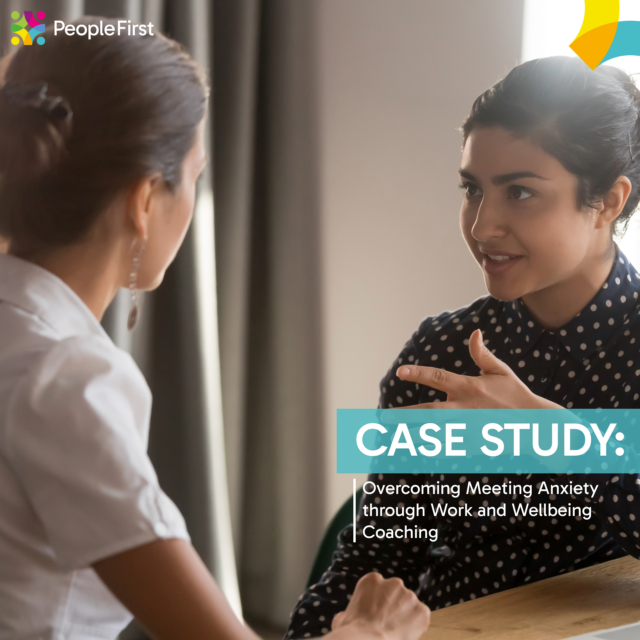
02 May 2024
Overcoming Meeting Anxiety
Are you wondering how our ‘Work and Wellbeing Coaching’ might support your employees? Explore a a recent anonymised case study to uncover deeper insights and understand how work and wellbeing coaching can effectively address meeting anxiety and foster confidence by tackling internal barriers through reframing negative thinking and implementing proactive strategies.
Case Study: Overcoming Meeting Anxiety through Work and Wellbeing Coaching
Client Background
Sarah is a mid-level manager at a marketing firm who has been struggling with confidence in meetings. She often finds herself hesitant to speak up, fearing judgment and criticism from her colleagues. Sarah wants to become more assertive in meetings and increase her contributions to team discussions.
Session Focus
The coaching session with Sarah focused on addressing her anxiety and building her confidence in meetings. The goal was to identify and overcome the internal barriers holding her back from actively participating and expressing herself effectively.
Identifying Interferences
During the initial sessions, Sarah and her coach explored the factors contributing to her meeting anxiety. They identified several key reasons:
- Lack of Experience – Sarah felt insecure due to her relatively limited experience compared to some of her colleagues.
- Fear of Failure – She was afraid of making mistakes or saying the wrong things in front of her peers.
- Lack of Opportunities – Sarah perceived a lack of opportunities to voice her opinions and ideas.
- Fear of Not Looking Knowledgeable – She worried about not appearing knowledgeable or competent.
- Fear of Not Being Heard – Sarah felt that her contributions might not be valued or acknowledged.
- Perfectionism – She held herself to high standards, fearing that anything less than perfect would reflect poorly on her.
- Procrastination – Sarah often delayed preparing for meetings or speaking up until the last minute.
- Comparison with Others – She frequently compared herself unfavourably to her more outspoken colleagues, further eroding her confidence.
Working Through the Issues
Through guided discussions and exercises, Sarah gained deep insights into how these internal barriers were affecting her confidence and performance. Her coach helped her reframe negative thinking patterns and develop strategies to overcome her fears. Some key interventions included:
- Reframing Negative Thinking – Sarah learned to challenge and reframe her negative self-talk, replacing it with more empowering and realistic beliefs.
- Setting Realistic Goals – She set specific, achievable goals for herself in meetings, such as speaking up at least once during each session.
- Building Confidence – Sarah practiced assertiveness techniques and role-played challenging scenarios to build her confidence in expressing herself.
- Self-Reflection – She committed to regular reflection and journaling to track her progress and celebrate her achievements, fostering a more positive self-image.
- Time Management – Sarah worked on improving her time management skills to reduce procrastination and better prepare for meetings in advance.
Outcomes
Over the course of several coaching sessions, Sarah made significant progress in overcoming her meeting anxiety. She became more assertive and proactive in meetings, contributing ideas and opinions with confidence. Sarah’s colleagues noticed her increased participation and valued her input, boosting her self-esteem further. By addressing the internal barriers holding her back, Sarah was able to unlock her full potential and achieve greater success in her professional duties.
Conclusion
This case study illustrates how work and wellbeing coaching can effectively address internal barriers to confidence and performance in the workplace. Through self-awareness, reflection, and targeted interventions, individuals like Sarah can overcome their fears and achieve their goals with greater confidence and resilience.
Can you think of any of your colleagues who might benefit from personalised 1:1 Work and Wellbeing Coaching?
Our tailored employee support services are designed to meet the unique needs of your employees, empowering them to take ownership of their wellbeing and personal growth. By fostering the development of effective wellbeing habits, employees experience a profound impact on their overall satisfaction, resilience, and fulfilment, leading to increased motivation and a positive sense of personal and professional wellbeing. This positive transformation empowers individuals to navigate challenges with greater ease, fostering a more positive and productive work-life experience.
Coaching packages start from £349 +VAT. Get in touch to explore our tailored employee support services.
Sign up to our newsletter to gain access to regular People First updates.




